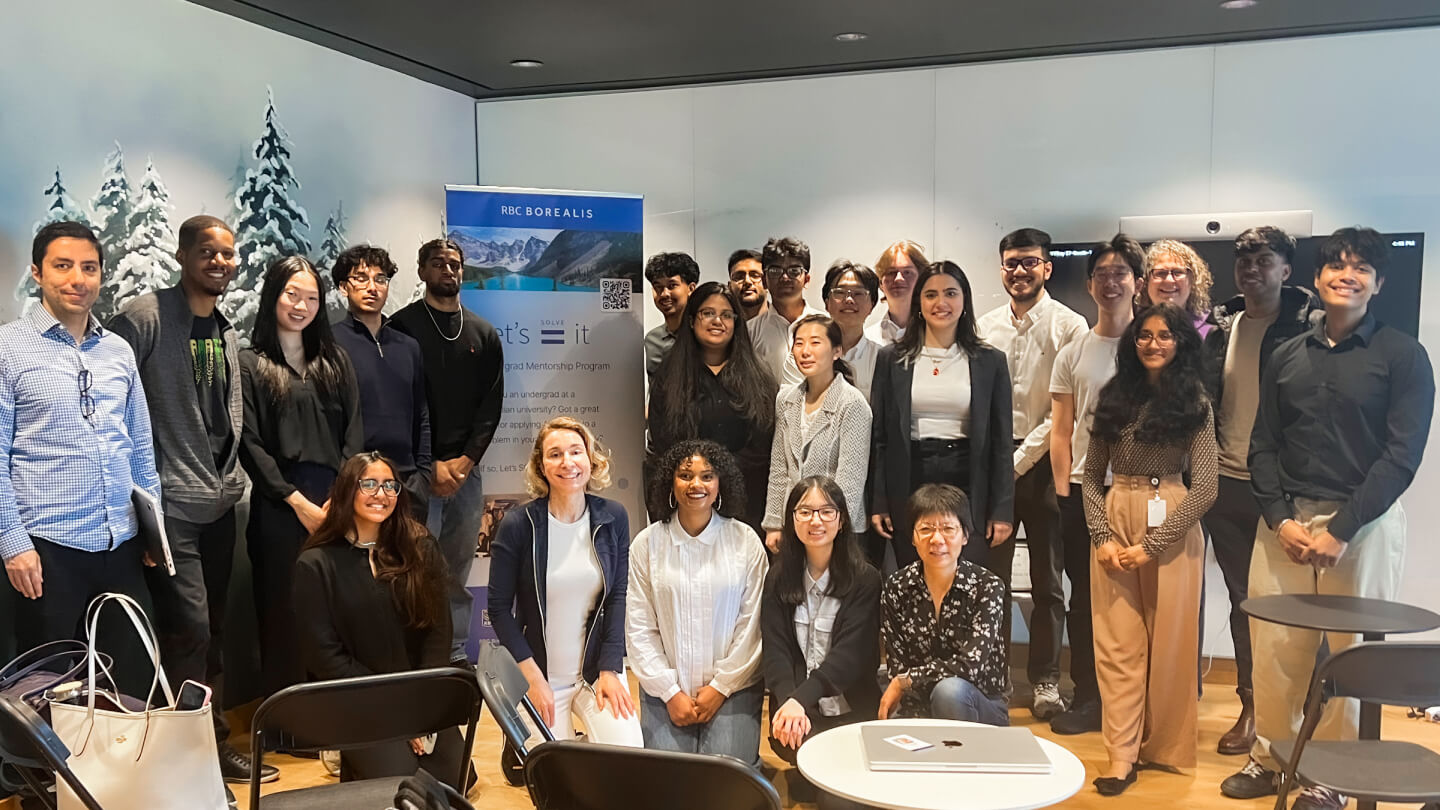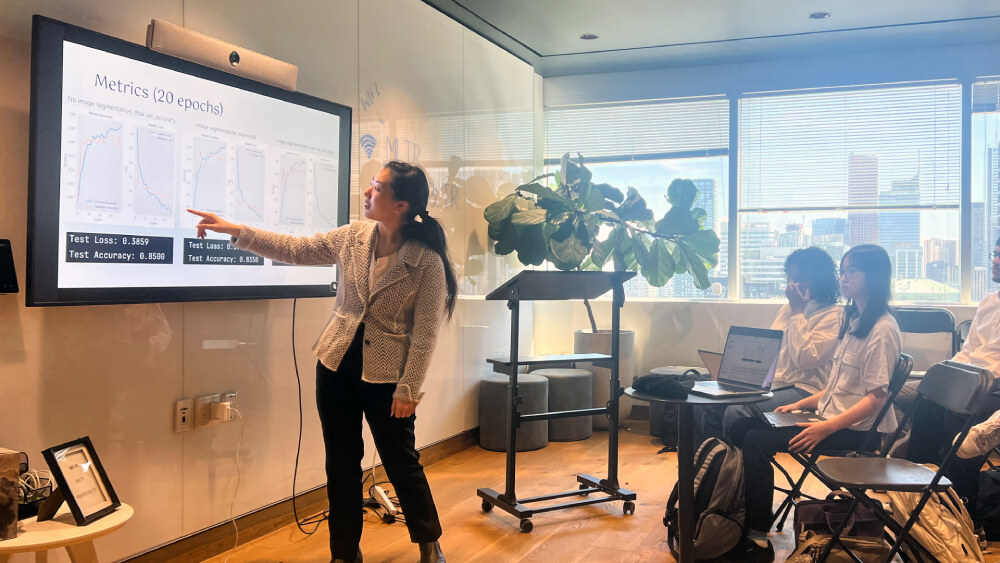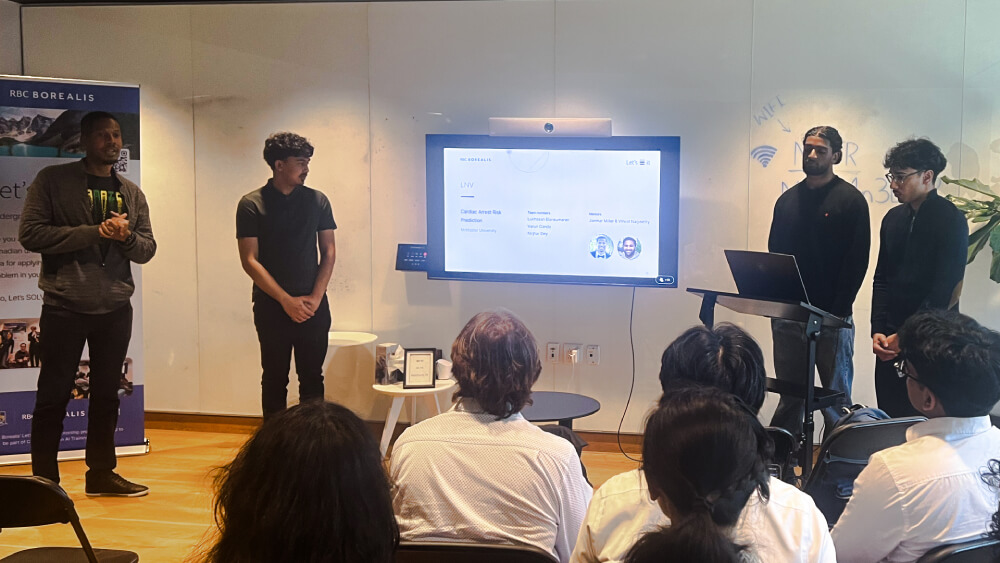
At RBC Borealis, we believe that new ideas, diverse perspectives, and applied learning are the foundation of responsible AI innovation. Our mentorship program, Let’s SOLVE it, brings this belief to life by equipping undergraduate students from across Canada with training, guidance, and mentorship to apply AI to meaningful challenges in their communities.
This past year, our Fall 2024 and Spring 2025 cohorts showcased inspiring projects that highlight the creativity and impact of the next generation of AI practitioners. From addressing climate change to improving healthcare and accessibility, these students demonstrated how technology, guided by mentorship, can create solutions that matter.
Spotlight on the Fall 2024 Cohort
BranchWise – Urban Forest Planning with AI
Students: Kennedy Barber, Sophia Cabungcal, Hussain Cochinwala, Myla Yambao
Mentor(s): Tochi Okeke, Nikoo Aghaei
A team of University of Alberta students created BranchWise, a machine learning model designed to improve Edmonton’s urban forest planning. By analyzing environmental and geographic data, the team recommended optimal tree species for different neighbourhoods, helping to improve biodiversity and address challenges linked to urban deforestation. Despite limitations in data diversity, their solution showed how AI can contribute to healthier, greener cities.
GoalGuru – Accessible Hockey Training
Students: Kowen Woo, Aaron Eaglechild, Garret Hrechka
Mentor(s): Dave Evans
The GoalGuru team from University of Alberta, Seneca and University of Victoria combined biomechanics and AI to democratize hockey training. Their mobile application analyzed player movement, delivering accessible, data-driven shot analysis that is typically available only through costly programs. By merging video analysis with real-time feedback, their project opens the door for young athletes across Canada to develop their skills more affordably and inclusively.
Unbiased.Rx – Equitable Drug Safety
Students: Ana Gordon, Le Thuy Duong Nguyen, Aime Tran Ba Huy
Mentor(s): Vin Bhaskara, RBC Borealis and Philip Mathew MD, External Clinical Expert
Recognizing the inequities in drug safety data, the Unbiased.Rx team from McGill developed an AI-powered platform to improve adverse drug reaction (ADR) predictions across diverse populations. Their solution integrates biomedical and clinical trial data to help healthcare providers make safer, more personalized prescribing decisions—showcasing how AI can directly improve patient outcomes and health equity.
Spotlight on the Spring 2025 Cohort
ASLytics – Real-Time Translation for Accessibility
Students: Ellie Chang, Napasorn Kao Ian, Japleen Kaur
Mentor(s): Edwin Ng
The ASLytics team from the University of Toronto addressed barriers faced by the Deaf and hard-of-hearing community by creating an AI-powered pipeline that translates YouTube subtitles into American Sign Language (ASL). Their prototype uses natural language processing and computer vision to generate animated sign language videos alongside original content—bridging a critical accessibility gap in online education and entertainment.
CardioVision – Predicting Cardiac Arrest Risk
Students: Lukhsaan Elankumaran, Varun Gande, Nirjhar Dey
Mentor(s): Jaemar Miller, Vineel Nigesety
From McMaster University, the team developed CardioVision, a predictive model that uses AI to analyze patient data and predict the risk of cardiac arrest. By improving early detection, their project has the potential to transform clinical decision-making, enabling faster interventions and ultimately saving lives.
Salus – Diagnosing Skin Conditions with AI
Students: Nina Dang, Cindy Hua, Mikayla Morrison
Mentor(s): Guy Morgenshtern, Atishya Reddy
The Salus team from York University and TMU focused on the shortage of dermatologists in Canada. Their project, DermaVision, applies machine learning to images of skin conditions to support earlier detection and provide triage support for non-specialists. By combining convolutional neural networks (CNN) with clinical data, their solution offers a scalable tool to improve access to dermatological care, particularly in underserved regions.


Diverse Talent, Real Impact
What unites these six teams is not just their technical creativity, but the diversity of their experiences and their commitment to impact. Students came from programs spanning computer science, biology, engineering, and cognitive science. They represented universities across Canada, including Alberta, McGill, Toronto, McMaster, and more.
Through mentorship from RBC Borealis researchers, engineers and business experts, they learned to refine their ideas, navigate challenges in data and model design, and translate their concepts into tangible prototypes. More importantly, they demonstrated how AI—when guided by diverse perspectives—can be a powerful tool for addressing social and community needs.
Shaping the Future of AI Together
Let’s SOLVE it reflects RBC Borealis’ belief that the future of AI depends on empowering the next generation of innovators. By supporting students with mentorship, training, and access to real-world challenges, we are helping them develop the skills to responsibly advance AI in ways that benefit communities.
We congratulate all the students from the Fall 2024 and Spring 2025 cohorts for their achievements—and look forward to seeing how their ideas continue to grow.
LSi Fall 2025 Applications Open
Apply by September 7, 2025. If you’re an undergraduate student with a bold idea and a drive to make a difference, we encourage you to apply and turn your vision into impact.
Apply today